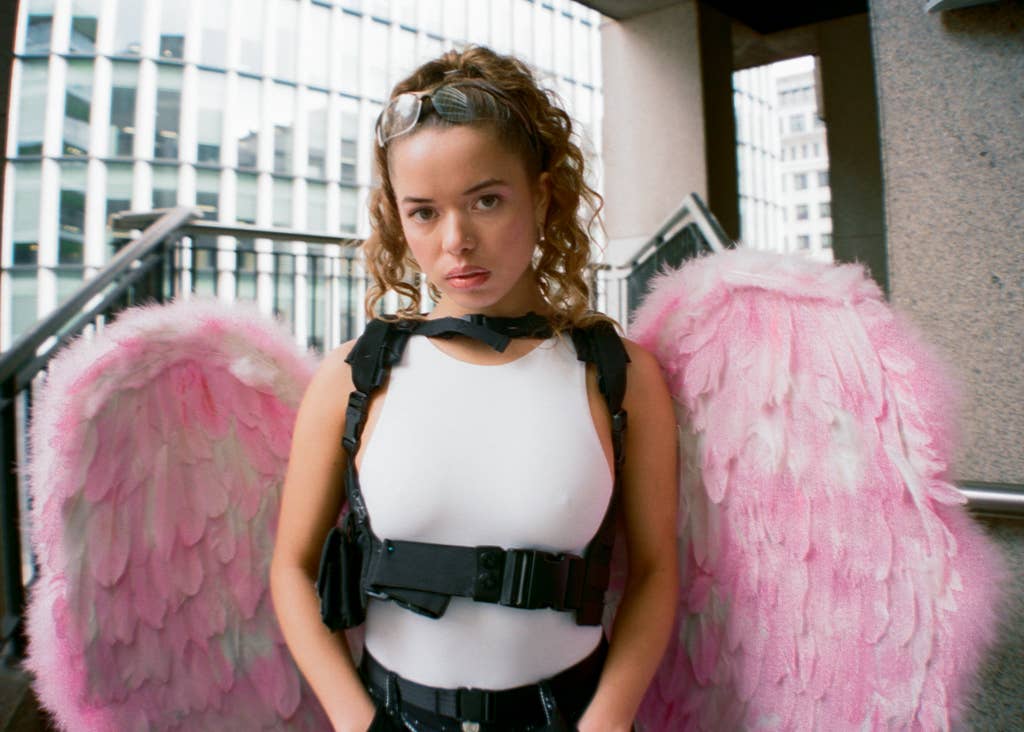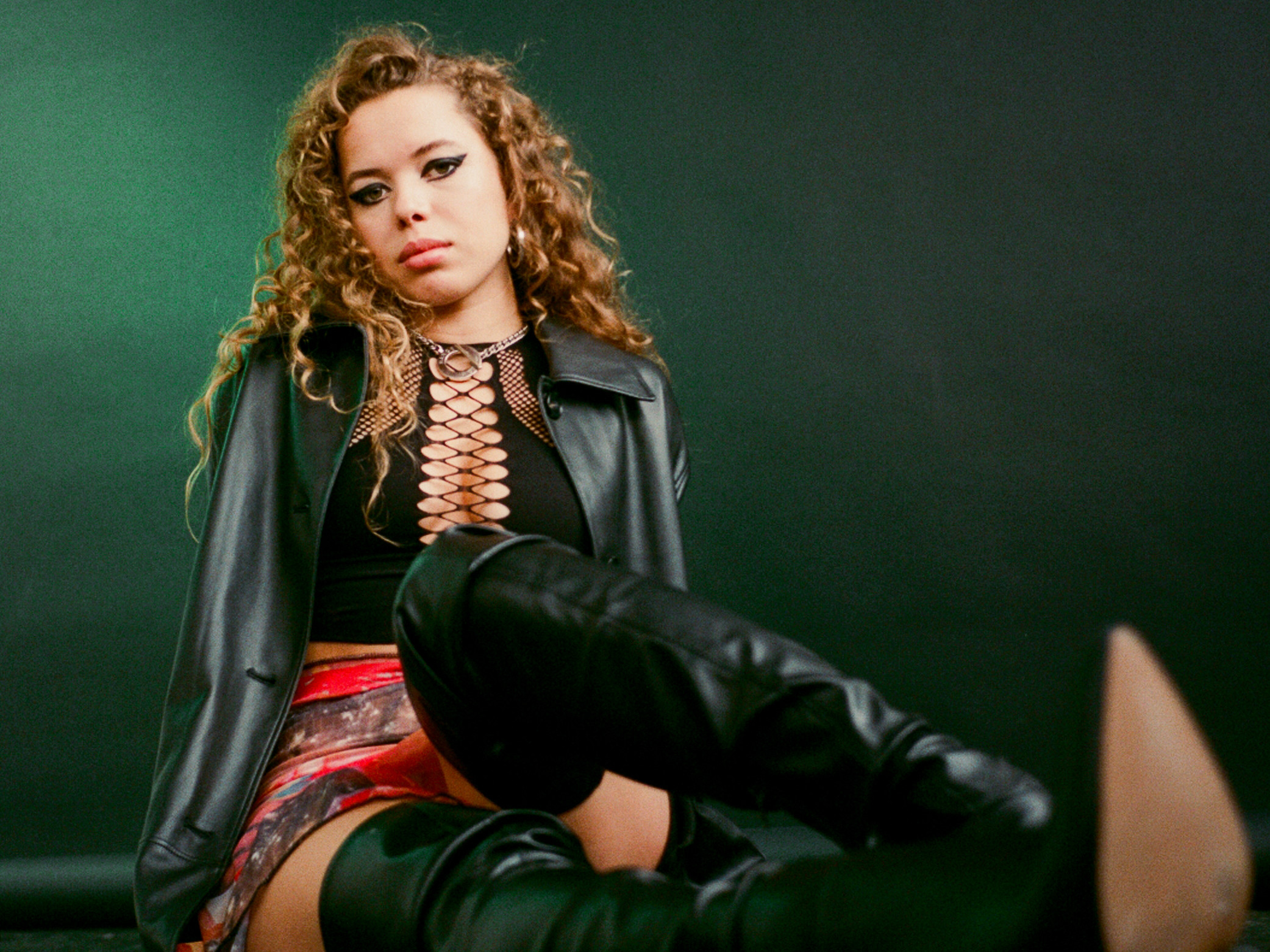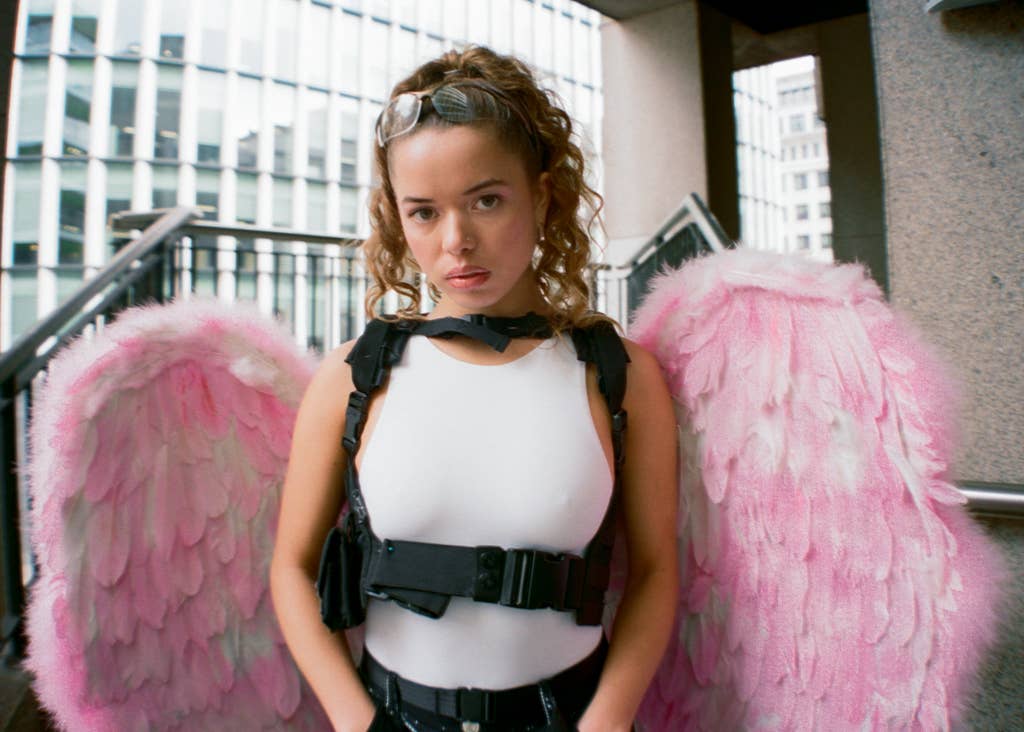
Back in 2016, we covered Nilüfer Yanya’s debut single “Small Crimes.” The Londoner had us captivated from the very start with her visceral songwriting and unique tone. Since then, Yanya has perfected the craft of making songs that sound huge and feel intimate at the same time. Her sophomore record PAINLESS, released earlier this month, is a nuanced exploration of numbness.
“Whenever you say painless, you’re talking about pain at the same time,” she explains. “Even within not feeling, you’re already feeling so many things. There’s a whole kaleidoscope of non-feelings.” On PAINLESS, Yanya’s layered vocals float over rattling drums, akin to the hustle and bustle of a big city. There’s an unexpected comfort in the turbulence of it all.
With a full schedule of shows and festivals ahead of her, Yanya is elated to be back onstage but already thinking about what’s next. She speaks humbly for a 26-year-old with two critically acclaimed albums under her belt and a world tour underway. “I’m moving away from the idea of making something perfect. I’ve learned that it’s more important to do what I can and what’s achievable. That sounds a bit depressing, but it’s better to make music than to not make music because I don’t think it’s good enough,” she says backstage before a sold out show in Zürich.
Yanya greets us with a smile via Zoom for a conversation about pink angel wings, solo songwriting, breaking in the US, and collaborating with her family.
Across your ever-evolving discography, guitar has always remained at the core. When did you first pick up a guitar and what keeps pulling you back to the instrument?
I started when I was 12 and that was how I began writing music. Playing guitar is my real personal connection with music and how I make songs. I don’t think that’s ever going to change.
Is there a specific artist or album that inspired you to pick up the guitar?
Nothing specific, just pop rock and pop punk. Nothing I would listen to now, but I really liked it when I was younger.
What are you listening to now?
I’ve been listening to Big Thief’s new album a lot, Kate Tempest’s new stuff, and Dorothy Ashby—a harpist from the ‘60s.
If you could pick any instrument to bring on tour with you, what would that be?
Well, there’s a couple… I’d bring someone to play the acoustic because it would be sick to add another guitarist to the band. Or someone to play saz because it has a little feature on my record and it would be good to do that properly. I’d like to find a person who can play both instruments. Maybe some strings and more vocalists. That would be cool.
I love how you involve family in your creative process, from recording at your uncle’s studio to working with your sister on music videos. What draws you towards working with your family?
It feels like a shame not to work with them when I can. They’re really good at what they do so why wouldn’t I ask them to help? Family is quite a precious thing and it doesn’t last forever—nothing does. Why not work together when you can?
How is working with your family different from other collaborators?
It’s the things you don’t have to say, the things you don’t have to talk about, and the things that just develop naturally.
I read that you can’t help but to feel like co-writing is less admirable than sitting down to write a song by yourself. Where do you think this idea comes from? Is it something you’ve learned to embrace or something you’re trying to shake?
When I started out, I was really proud of the fact that I was writing songs by myself. You kind of use it as a selling point. People are like, “oh, you write your own songs?” They seem more impressed when you’re a solo writer. In my head, I started to think that if I was just a singer, I wouldn’t be able to do what I was doing.
For me, the writing is even more important than the fact that my name’s attached to it. That’s where my ego is. Admitting that sometimes I need to share that with other people can be quite difficult. I wish I could do this all myself, but I can’t. I love the idea of being totally absorbed in something and focusing on making the exact thing that’s in your head.
I think co-writing is just as special as writing by yourself, it’s just different. I wasn’t seeing it the right way before because I hadn’t written with people that I was close to. Now that I have, I see it as a really special thing, it’s just not something that can happen all the time.
I wish I could do this all myself, but I can’t. I love the idea of being totally absorbed in something and focusing on making the exact thing that’s in your head.
Are there any songs on PAINLESS that wouldn’t have come together without a co-writer or collaborator?
I worked with my friend Will Archer on like seven songs, so most of the record wouldn’t have happened without collaboration. I think that’s the main reason why this album is different.
You have some great remixes across your discography. If you could pick any artist to remix a song off PAINLESS, who would it be?
Frank Ocean on “Chase Me” or “Trouble.”
I’d love to hear that.
Manifest.

Can you tell me what the album name PAINLESS means to you?
It’s talking about the lack of feeling, a kind of numbness. Sometimes that can be good and sometimes that can be bad. It especially doesn’t feel great the longer it goes on. But even within not feeling, you’re already feeling so many things. There’s a whole kaleidoscope of non-feelings. Whenever you say painless, you’re talking about pain at the same time.
I notice a lot of intense physical imagery in your lyrics—blood and bones and bruises. Was that intentional or did it just come out naturally as your album took shape?
I think it just came out—the desire to get out of your own head and to move to the more physical things like nature and your body. I think the physical aspect is quite important.
Pink angel wings have become a recurring image across your visualizers, music videos and live performances. What draws you to them?
They symbolize the free-spirited, lighthearted side of the record. It’s the fantasy, the escapism, and the beauty amongst rough things. The wings were on the artwork that I made so I asked my friends Joviale and Jenna to make them. Joviale makes music too so check it out—you’ll like it.
The sonics of PAINLESS are entrancing. I hear a lot of double tracked vocals and layered instruments like the saz in “L/R.” What makes you gravitate toward that wide, layered sound?
It’s for functional reasons with the vocals. I’m singing softly for most of this record, but I don’t have a very big voice so I layer my vocals to get that strong effect. I’ve double tracked vocals forever—that layering always sounds better. It’s a rich, chorused sound and you feel like you can like sit in it.
I’ve heard you express frustration about people labeling your music as R&B. What does it feel like to be mislabeled as an artist?
More than anything, it takes away from other people’s work who are actually in that genre. I think a lot of people probably get mislabeled because genres are opinion-based. But my music’s just not R&B. [Laughs]
A lot of younger listeners grew up in a world where genres blend together and new genre names are made up every few months. What do you think that means for terms like rock and R&B?
I don’t think they’re going anywhere because they’re already so solidified. But I think it’s useful to have new genre names because it opens your mind to what’s possible.
Your debut album Miss Universe was tied together through a series of skits. On the other hand, PAINLESS doesn’t have any skits, finding cohesion though its sonics and lyricism. Was this something that you set out to do when you started the project?
I knew I wanted to let the music speak for itself, but I didn’t plan to do it this way. At the time, I second guessed if it was finished because it didn’t have all these additional touches. The other day, I read that “nothing is finished until you show it to someone.” Nothing is finished until someone else hears it or until someone else reads it—art is cooperative. It’s not just made for you, it’s made for other people as well, so that’s probably why it feels unfinished sometimes.
How do you know when a project is finished and it’s time to share with somebody else?
It’s just when you feel like you can’t make it any better. Or you start to make it better and it just gets worse. I don’t think anything’s ever really finished, finished. The question is, how much time do you want to spend on it? [Laughs] When do you want to move on to do something else?
Do you see the pursuit of perfection as a detriment to your creativity?
Yeah. I don’t think it’s very helpful to me. I was being quite harsh on myself because none of my music sounded the way I imagined, but that doesn’t really matter. I mean, it matters in terms of my own personal goals, but as long as I’m still making music, that’s the ultimate goal.
These days, it’s almost essential for artists to overshare and create this world around themselves to keep the attention of fans. Is that draining? Do you enjoy things like social media, photo shoots, interviews or would you rather just focus on music?
It’s a good time when you have interviews and it’s a good time when you are promoting your work on socials—those are good things to be doing. But when it takes up more time than the music, that can be frustrating. I’m a bit more minimalist when it comes to being on socials and all that. I don’t think it’s that healthy for anybody.
I read that you’ve avoided some sketchy music industry situations throughout your come-up. What advice do you have for young artists learning to navigate the industry?
Make friends with people who work in the same field as you. Find people you can trust—where you’re not pretending or having to change yourself. That’s the most valuable thing because you can always go to them for a second opinion on things. And it’s such a cliche, but do your best to stay honest with yourself. I think it’s really hard though. It’s a really hard thing to know when something’s not right.
Who are some of those people you can trust?
My band and my family.
We’re seeing a lot of young artists from the UK break in America, which I’ve heard is a difficult process. How has that experience been for you?
I’m still working on it. It’s daunting because America is so big. It’s a “big market” as people say. There’s so many American artists that people in the UK have never heard of that have their whole career in the US. It’s kind of harder to do that in the UK because there’s less people to listen to your music.
When you’re touring, do you notice a difference between audiences in the UK and the States?
I don’t notice a big difference between countries, but I do notice a difference between cities. In a bigger city, you get the sense that people are a bit more critical, but in a good way because they’re more used to the whole experience of seeing a show. I get the sense that people in smaller cities are a bit more excited.
We saw you perform years ago and you covered “Hey” by Pixies. Are you working on any new covers?
We’ve been doing a cover of “Rid Of Me” by PJ Harvey. It sounds very good. We’ll probably be doing that in the States as well.
Outside music, what are your plans when you get back from tour?
I have a lot of *sorting out my life* things to do. I’d like to live somewhere else. It’d be kinda cool to have a different life. I’m thinking about Istanbul. It’s a very affordable state to live in.
My dad’s from there so I have family in Istanbul. It’d be nice to live there for a bit and not feel so disconnected. I haven’t been in a while and I’ve never been for more than two weeks at a time, so I don’t really know the place.
Before we wrap up, can you tell me about Artists in Transit?
It’s a collaborative arts project that my sister and I started in 2016. We supply art workshops for people that might not otherwise get that experience. We started off working with refugee communities in Athens and did that until the pandemic hit. Since then, we’ve been working more in London. The project is a way of showing solidarity and connecting with people who we’re told not to connect with and not to try to understand.
What are the next steps for this project?
Just to keep going and find ways to keep it sustainable. The growth is that we keep going, not that we expand.
What can we expect from you throughout the rest of 2022?
This year’s going to be a lot of touring and playing festivals. I’m hoping to go to some places I haven’t been before.We’re looking at South America, which is cool.
Listen to Nilüfer Yanya’s new album ‘PAINLESS’ here.




